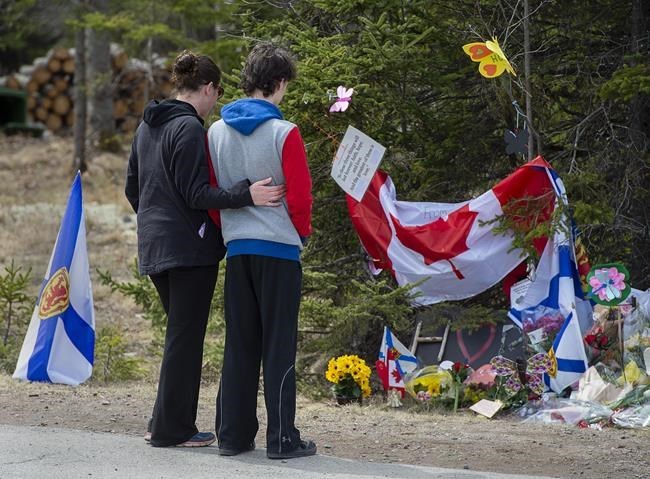HALIFAX ŌĆö Relatives of victims killed in a mass shooting in Nova Scotia say they are feeling "deep discouragement" with the public inquiry investigating the horrific 2020 crime that claimed 22 lives, their law firm says.
With one week left before the proceedings are to begin in Halifax, Patterson Law issued a statement late Monday saying its clients are worried their role in the inquiry will be "unduly reduced, if not actively restricted."
The Nova Scotia law firm, which represents 23 families and individuals, said the delayed federal-provincial inquiry has offered little information about the role witnesses will play in the proceedings.
As well, Patterson Law says it is worried the fact-finding portion of the inquiry will be truncated as a result of the delays, which means evidence before the inquiry may not be fully explored.
"We share our clientsŌĆÖ deep discouragement at the limited information about these public proceedings," the statement says.
The inquiry's mandate requires it to file a final report by Nov. 1.
At this point, it remains unclear who will be called as witnesses, how they will be asked to give evidence and whether lawyers representing the families will be allowed to question them or make any kind of submissions at the proceedings, the statement says.
Senior commission counsel Emily Hill did not directly address those questions in an emailed statement, and commission officials declined a request for an interview.
Hill said the commission will continue to consult participants about gaps in the factual record and witnesses they would like to hear from.
"A public inquiry is not a trial, nor is it about assigning blame," she added. "Public inquiries are about change. The commissionŌĆÖs work is to determine what happened and why and how it happened in order to make recommendations that will help make sure it does not happen again."
Three months after the killings in central Nova Scotia, the federal and provincial government's pledged to conduct some sort of "review" into the case, but the victims' families and legal experts came forward to demand a more rigorous joint inquiry. A series of protests prompted the two levels of government to change course.
"I feel severely let down," Nova Scotia resident Nick Beaton said in the law firm's statement. Beaton's pregnant wife, Kristen Beaton, was fatally shot by the gunman in Debert, N.S., on April 19, 2020. At the time, the killer was disguised as a Mountie and was driving a car that looked exactly like an RCMP cruiser.
"I fought so hard for this public inquiry so that another husband and father would not have to go through this," Beaton said. "The commission is supposed to ask the hard questions and identify where things went wrong and how things need to change, but right now I just donŌĆÖt see that happening.ŌĆØ
Ed Ratushny, a professor emeritus at the University of Ottawa's law school, said the information requested by the lawyers is justified.
"I can't understand why the commission has not already provided it, not only to the lawyers but also to the entire public," Ratushny said in an email.
"Public inquiries are created because the public does not trust other institutions to fulfil their function. But the Patterson document appears to conclude that the public may be on the verge of not trusting this commission either."
Ratushny, author of the 2009 book, "The Conduct of Public Inquiries," said the law firm's letter represents "a serious condemnation of the commission's failure to disclose completely what it has done to date, how it will proceed from here and why they have waited so long to reveal all of this."
The inquiry has been asked to determine what happened during the gunman's rampage, which began on April 18, 2020, in Portapique, N.S., where 13 people were gunned down and properties were set on fire. Another nine people were killed the following day as the gunman eluded police during a chase that spanned more than 100 kilometres. The commission was initially supposed to begin hearings last October.
Nova Scotia lawyer Adam Rodgers, who has a blog about the proceedings, has also been raising questions about the inquiry's approach.
It would appear the inquiry will by relying on surveys, panel discussions and previously compiled "foundational documents" to provide evidence at the hearings, rather than the traditional method of calling witnesses to face direct questioning and cross-examination, Rodgers said.
"It's meant to save time on testimony," Rodgers said in an interview Monday. "If it looks like the commission will be presenting documents and presenting their version of events, that would undermine the credibility of the commission."
In a statement released Jan. 31, the commission ŌĆö known formally as the Mass Casualty Commission ŌĆö stressed that its work is guided by restorative principles to help minimize further harm.
"This does not mean the commission is avoiding disagreement or difficult questions and answers," the statement said. "What it does mean is we are attentive in how we go about our work and to the experiences of those who have been most affected by the mass casualty."
Rodgers said witness testimony is key to any inquiry, referring to his experience with the provincial fatality inquiry in Nova Scotia investigating why former Afghanistan war veteran Lionel Desmond killed three family members and himself in January 2017. That inquiry is set to resume next month.
"It was difficult for family members to get on the stand and talk about their lost loved ones," Rodgers said.
"But it was also an opportunity for them to process their own emotions .... If we're going to miss out on that because of some misguided sense of people's trauma, then I think that's going to be a lost opportunity."
This report by The Canadian Press was first published Feb. 15, 2022.
Michael MacDonald, The Canadian Press



